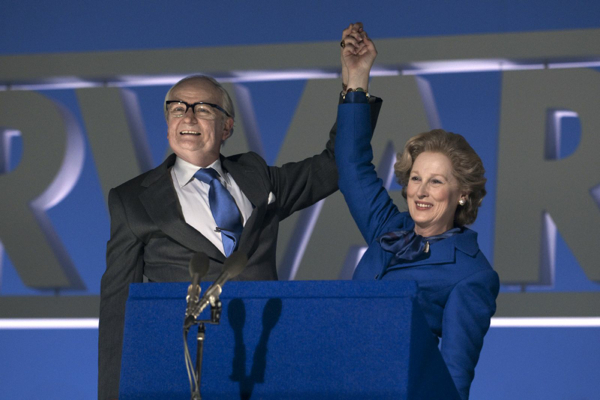Movie review by Greg Carlson
Waterlogged with the worst clichés of the biopic, not even a committed act of Meryl Streep’s vaunted mimicry can buoy “The Iron Lady.” Skittering over the highlights of Margaret Thatcher’s political career without ever stopping to take intellectual stock of the historical details that undoubtedly required tremendous thought, concentration, and collaboration, Phyllida Lloyd’s film is much like Thatcher’s well-known coiffure: artificially volumized to appear fuller than it really is.
Surprisingly fixated on Thatcher’s dotage, in which the once fearsome leader regularly hallucinates her dead helpmate Denis (embodied by an impish James Broadbent) the elementary screenplay by Abi Morgan makes only vague efforts to frame Thatcher as a symbol of feminist empowerment. Instead, the movie returns again and again to scenes in which a panicky, paranoid, and frankly pathetic old woman struggling with dementia struggles to reconstruct the memories of her trials and triumphs on the world stage.
When Lloyd touches on scenes of Thatcher’s 1980s heyday, the inevitable cutaways to stock footage undermine expectations of quality and do the director and subject no favors. Without exception, Thatcher’s contemporaries and colleagues are indistinguishable from one another, and not a single scene depends on the scripted interplay between two sharp minds grappling with the intricacies of policy-making. Instead, Thatcher is shown repeatedly scolding even her party allies; in one embarrassing scene, the incensed PM gracelessly dismisses a meeting. It’s meant to show how hard Thatcher fought to be respected and kept in the loop, but it comes off like a petty tantrum.
Streep is abetted in the principal role by Alexandra Roach, who plays Thatcher as a young woman inspired by her grocer/mayor father to make something of herself. The audience is asked to take the emergent politico’s positions and beliefs on faith, since the fundamentals of her alignment with any specific party are absent. The film’s critical thinking skills are so weak, the viewer is asked to imagine the reasons for shots of champagne-swilling “Maggie’s Millionaires,” as well as all references to union busting. Inexplicably, Thatcher’s struggles with Northern Ireland and the IRA are sketchy footnotes. The 1979 assassination of Thatcher’s mentor Airey Neave, the 1981 hunger strike, and the 1984 Brighton hotel bombing are presented without context or insight.
Even with the movie’s weird framing of Thatcher as a slipping, senile crone, “The Iron Lady” is standard hagiography, inevitably overlooking any number of Thatcher’s worst tendencies. The movie doesn’t even bother to address Thatcher’s acquisition, courtesy of the Soviet Defense Ministry’s “Red Star” mouthpiece, of the title nickname. Pal Ronald Reagan appears only in a fleeting montage, all but eliminating the one big figure that might have been played as a pivotal character instead of the well-used caricature. Thatcher’s hawkish defense of colonial interests during the 1982 Falklands War eats up more screen time than many of the leader’s other milestones. The movie drolly asserts that Thatcher’s own policies had created the conditions that led to Argentina’s amphibious landings, and it is fun to hear Streep say “junta.” The accompanying, unintentionally funny shot of Thatcher as she broods over a naval strategy map looks like it was stolen from the satirical “Spitting Image” puppet show – which boasted a Thatcher at least as memorable as the one concocted in “The Iron Lady.”
